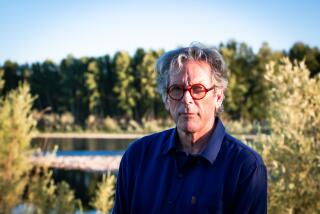Louis Owens, 53; Native American Writer of Fiction, Scholarly Works
Louis Owens, a prize-winning novelist and scholar who wrote about Native American life, died Thursday in Albuquerque of an apparently self-inflicted gunshot wound. He was 53.
The author of “The Bone Game,” “Dark River,” “The Sharpest Sight,” “Wolfsong” and “Nightland,” all works of fiction, apparently shot himself in the chest at the Albuquerque airport early Wednesday.
He was taken to the University of New Mexico Hospital, where he died Thursday afternoon, according to airport and hospital officials.
At the time of the shooting, Owens was en route to Bellingham, Wash., where he was scheduled to participate in a writing conference for Native Americans.
According to airport spokeswoman Maggie Santiago, a passenger heard a shot, saw Owens slumped over and called police. A pistol was found with him.
“All the physical evidence indicated it was a self-inflicted gunshot wound” and that nobody else was involved, Santiago said. A note found with him asked that his wife, Polly, be notified, she added.
Owens, who was of Choctaw, Cherokee and Irish ancestry, had been a front-line voice on American Indian literature.
“I write, in part, to explore my own identity as a mixed-blood American ...,” he told Contemporary Authors a few years ago. “And I write to explore the dilemmas of all mixed-bloods in America.”
He won a Wordcraft Circle Writer of the Year award in 1998 for “Mixedblood Messages: Literature, Film, Family, Place.” One of his best-regarded works was “Other Destinies: Understanding the American Indian Novel.” He had won a National Endowment for the Arts Creative Writing Fellowship in 1989.
“As somebody of that generation, late 40s early 50s, he was just galvanizing both in terms of his fiction and his criticism,” said University of New Mexico English professor Pat Smith, a Micmac Indian. “He did that thing which is not usual for creative writers, being known equally as a scholar and a creative writer.”
Owens also had been on the faculty at UC Davis. English professor Jack Hicks, a colleague and one of his former teachers, described Owens as “a person of real character--quiet, very dependable and very generous with his time with students and faculty.”
“I would list him as the leading scholar on Native American fiction in the country,” Hicks said. Owens was born in Lompoc, Calif. One of nine children of laborer parents, he grew up in poverty and spent much of his childhood moving between Mississippi and California.
He had his first job at age 9 picking beans, an experience that later would lead him to Steinbeck’s classic novel “The Grapes of Wrath.” He wrote two critical works on Steinbeck--”The Grapes of Wrath: Trouble in the Promised Land” and “John Steinbeck’s Re-Vision of America”--that have earned praise for their balanced assessment.
He formed the idea for his first novel, “Wolfsong,” when he discovered plans for a copper strip-mining project in the heart of Washington’s Glacier Peak Wilderness area, where he had worked as a ranger. Unable to interest environmental magazines in the story, he decided to write a novel about the strip-mining plan from the perspective of a young Native American whose ancestors had lived on the mountain.
As a novelist, he gained a reputation for skillfully merging thriller-type plots with serious, universal themes.
Owens, who earned his bachelor’s and master’s degrees from UC Santa Barbara and his doctorate from UC Davis, also wrote “American Indian Novelists: An annotated Critical Bibliography.” He taught English at the University of New Mexico in Albuquerque, before returning in 2000 to UC Davis as a professor. He also had taught at Cal State Northridge.
In addition to his wife, Owens is survived by his daughters Elizabeth and Alexandra.
More to Read
Sign up for our Book Club newsletter
Get the latest news, events and more from the Los Angeles Times Book Club, and help us get L.A. reading and talking.
You may occasionally receive promotional content from the Los Angeles Times.







